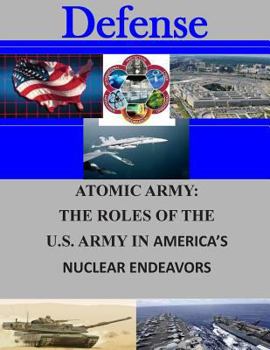Atomic Army: The Roles of the U.S. Army in America's Nuclear Endeavors
This book examines the roles of the U.S. Army in America's nuclear undertakings. Since 1942, when the Army took responsibility for managing the Manhattan Project, the Army has made many important contributions to America's nuclear endeavors. Its earliest nuclear roles included developing and employing America's first nuclear weapons, executing nuclear counter proliferation missions, investigating the effects of nuclear weapons, and supervising the U.S. atomic energy program. Although the Army's nuclear responsibilities were altered during the early years of the Cold War, it continued to participate in America's nuclear efforts. The Army's Cold War nuclear roles included deploying tactical nuclear weapons, participating in nuclear weapons tests, developing doctrine and reorganizing the Army's units in preparation for a nuclear war, managing a nuclear power program, contributing to the debate on national strategy, and helping to reassure U.S. allies and prevent the proliferation of nuclear weapons. Today, the Army continues to make important contributions to the nation's nuclear endeavors, notably in preparedness for attackforensics and consequence management. U.S. strategic planners must understand the several nuclear functions that the Army has performed throughout history in order to appreciate more fully the relevance of the Army's current nuclearcapacities.
Format:Paperback
Language:English
ISBN:1505748410
ISBN13:9781505748413
Release Date:December 2014
Publisher:Createspace Independent Publishing Platform
Length:138 Pages
Weight:0.74 lbs.
Dimensions:0.3" x 8.5" x 11.0"
Related Subjects
HistoryCustomer Reviews
0 rating





